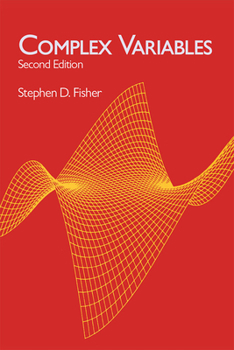Complex Variables: Second Edition
Select Format
Select Condition 
Book Overview
The most important topics in the theory and application of complex variables receive a thorough, coherent treatment in this introductory text. Intended for undergraduates or graduate students in science, mathematics, and engineering, this volume features hundreds of solved examples, exercises, and applications designed to foster a complete understanding of complex variables as well as an appreciation of their mathematical beauty and elegance. Prerequisites...
Format:Paperback
Language:English
ISBN:0486406792
ISBN13:9780486406794
Release Date:February 1999
Publisher:Dover Publications
Length:448 Pages
Weight:1.37 lbs.
Dimensions:1.0" x 6.5" x 9.2"
Customer Reviews
5 ratings
I like this book.
Published by Thriftbooks.com User , 15 years ago
My teacher used this book for the class. So we bought this books. The book is good.
Cheap
Published by Thriftbooks.com User , 15 years ago
I was worried for the cost of my books this quarter, but this book was affordable and it was great having it new.
Inexpensive Intro to Complex Variables
Published by Thriftbooks.com User , 16 years ago
Dover publications are inexpensive excellent-quality textbook-like items for self-study or review, and this item is no exception. I am using this book to learn complex variables for the first time. Examples are clear, with enough "missing" steps to challenge the student without confusion. The chapter on Analytic and Harmonic functions and their applications is particularly good. There are certainly more costly books, but this one packs in a lot of information for the money.
an excellent beginning
Published by Thriftbooks.com User , 18 years ago
Fisher's book is ideal for a first course in complex variables: the complex plane, geometry of the plane, analytic functions (zeros, singularities, residue computations), Cauchy-and residue theorems, harmonic functions, conformal mappings, boundary value problems, applications, and a lovely last chapter on transform theory, Fourier, Laplace etc, and using contour integration. Pedagogical features: The figures and illustrations are lovely! The exercises are many and well designed. Inclusion of solutions to odd-numbered exercises represents a good compromise. The book will work well for a mixed audience, students in math, in science, and in engineering alike. The presentation starts with a review of complex numbers functions and sequences, moves quickly to central aspects of complex function theory, elementary geometry, Mobius transformations, and conformal maps. The book was published first in 1990, but reprinted since by Dover, starting in 1999. It is suitable as a text or as a supplement in a beginning course in complex function theory, at the undergraduate level. And it is suitable for self-study. While it contains the standard elements in such a course, we note that a systematic treatment of physical problems comes relatively late, in Section 4.2, beginning on page 254 (a little past halfway into the book.) Some readers might want to begin with that. There are other Dover titles on the same subject, also elementary and suitable for a first course. They are slanted differently, and in particular, they point to different applications. Fisher's inclusion of transform theory gives this book an edge. See however also Churchill-Brown. Other Dover books: We recommend the books by Fisher, Volkovyskii et al, Silverman, Schwerdtfeger, and Flanigan; all inexpensive! These books cover the fundamentals in functions of a single complex variable: analytic, harmonic, conformal mappings, and related applications. Further, there are non-Dover books such as: (a) R. V. Churchill - J. W. Brown, and (b) J. E. Marsden - M. J. Hoffman; both a lot more expensive. Review by Palle Jorgensen, August, 2006.
Great text
Published by Thriftbooks.com User , 24 years ago
It is wonderful to see this great book on undergraduate complex analysis back in print at even a more affordable price. I've used it in in one of my junior level courses and been totally satisfied with it. I will use a part of it again in a continuation course.What is nice about this book is that it is a textbook, and not a cookbook nor a book that tries to include everything and fails at all of them. This book never lists too many results; instead it aims at the understanding of the subject matter. Its treatment of Cauchy's theorem clearly exposes the fact that different points of view (derivatives, series, integrals) in the complex plane lead to the same object, analytic functions. The sections on geometric and applied topics, such as linear fractional transformations and fluid mechanics, are a delight to read.The book assumes nothing other than calculus (Green's theorem) as background. Topological concepts are kept at a reasonable level and some are introduced later when necessary so as not to hinder the development of its main topic. Some short side issues are discussed in tiny sections within the exercises. There are also plenty of regular exercises ranging from elementary calculations to rigorous proofs. This book also contains an appendix that I love on the zeros of polynomials, including the cubic and the quartic.What attracted me most in this book is that one can read it straight through. There are no secondary undeveloped paths, sections to omit, unnecessary details, or long list of formulas. I recomend it for any course or self-study at the introductory level complex analysis.





